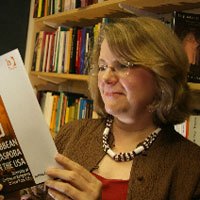
Dr Bettina Schmidt is Professor in the Study of Religions at the University of Wales Trinity St David. Here she teaches on the study of religions and anthropology of religions. She has an academic background in Cultural Anthropology which studied together with Religious Studies and African Languages at the University of Marburg in Germany. In 2004 she moved to the UK and taught first at Oxford and then Bangor University before moving on to Trinity St David.
Bettina is now President-Elect of the BASR. She is a member of the Peer Review College of the Arts and Humanities Research Council and member of the advisory board for the Oxford Research Encyclopedia of Religion. She has served on the sub-panel for Theology and Religious Studies of the Research Excellence Framework in 2014 and will do so again in 2021.
For our eighth(!) annual special, Only Sixty Seconds returns! This time, Chris Cotter is your host, as David G. Robertson returns to defend his 2018 crown against Bettina Schmidt, Douglas Davies and Theo Wildcroft. We may not have avoided repetition, but I do not hesitate in promising you no deviation from hilarity!
Vivian Asimos and Theodora Wildcroft took the opportunity to ask the delegates of BASR 2019 what inspired them about the conference theme, their opinion about major trends in the discipline, and how they were personally feeling about REF 2021.
In this discussion, Professor Schmidt discusses her keynote lecture at the Open University's "Contemporary Religion in Historical Perspectives: Publics and Performances". We turn back to discuss some of the "founding fathers" of the discipline of Religious Studies: Rudolf Otto, R.R. Marrett, and Andrew Lang.
Bettina Schmidt and David Wilson organised a series of panels at the 2014 BASR Conference in Milton Keynes on the topic of "Studying Non-Ordinary Realities", as part of the conference's "Cutting Edge" sub-theme. We managed to make time to get Bettina and David,...
Following from our interview on Monday with Ingvild Gilhus, today's podcast presents an "authors meet critics" session on the new edited volume by Ingvild Gilhus and Steven Sutcliffe, New Age Spirituality: Rethinking Religion. This was recorded at the University of Edinburgh at the launch of the book,
An 'emergency broadcast' from the Religious Studies Project... featuring George Chryssides, Bettina Schmidt, Teemu Taira, Beth Singler, Christopher Cotter, and David Robertson. What did the 2011 census data actually say, and how did the press report it? Why does it matter, and how can we use the data more constructively?
Does the public benefit from the social-scientific study of religion? Should it? How do we demonstrate benefit, measure it, communicate it? What are the practical and theoretical issues surrounding the idea of how the study of religion can operate in the, or perhaps as a, public good? For that matter, what do we mean by ‘public’ or ‘benefit’?
“If we want to discover what [wo]man amounts to, we can only find it in what [wo]men are: and what [wo]men are, above all other things, is various. It is in understanding that variousness – its range, its nature, its basis, and its implications – that we shall come to construct a concept of human nature that, more than a statistical shadow, and less than a primitivists dream, ...
This week we decided to do something a bit different. Every time David and Chris have conducted an interview, they have been asking the interviewees an additional question: “What is the Future of Religious Studies?” The result is this highly stimulating compilation of differing perspectives and levels of optimism The result is this highly stimulating compilation of differing perspectives and levels of optimism on what has become one of the most hotly debated topics in the academic study of religion at the start of the second decade of the twenty-first century.
This work is licensed under a Creative Commons Attribution- NonCommercial- NoDerivs 3.0 Unported License.
The views expressed in podcasts, features and responses are the views of the individual contributors, and do not necessarily reflect the views of The Religious Studies Project or our sponsors. The Religious Studies Project is produced by the Religious Studies Project Association (SCIO), a Scottish Charitable Incorporated Organisation (charity number SC047750).